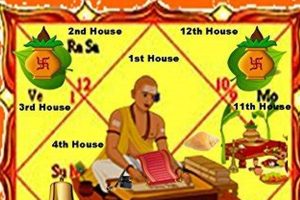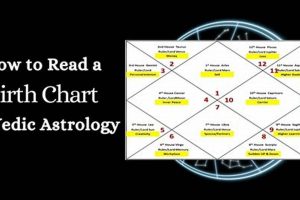In Jyotish, the Vedic system of astrology, the outer planets Uranus, Neptune, and Pluto are relatively recent additions, unlike the traditionally recognized planets from the Sun to Saturn. These modern planets are not typically used in traditional chart interpretations that focus on the core principles of Vedic astrology, such as nakshatras (lunar mansions) or dasha systems (planetary periods). However, some contemporary astrologers incorporate these outer planets, associating the dwarf planet Pluto with transformative forces, destruction and rebirth, and the unconscious mind. For instance, Pluto’s placement in a specific house may be interpreted as an area of life requiring profound change and growth.
The inclusion of outer planets offers a different lens through which to examine a birth chart, potentially adding layers of nuance to understanding psychological complexities and karmic patterns. While not universally accepted within the Vedic tradition, exploring their influence can provide valuable insights, particularly for astrologers interested in integrating modern psychological perspectives with ancient wisdom. It is essential to acknowledge that the interpretation of these newer additions is still evolving and not as established as the classical principles.
This exploration will delve further into the specific interpretations associated with Pluto in Vedic astrology, examining its potential impact on various houses and its interaction with traditional planetary influences. We will also discuss the controversies surrounding the use of outer planets within this ancient system, providing a balanced perspective on this evolving area of astrological study.
Integrating Trans-Saturnian Influences
The incorporation of Pluto into a Vedic astrological reading requires careful consideration. These tips offer guidance for navigating this complex area:
Tip 1: Prioritize Traditional Principles: A solid foundation in core Vedic concepts is paramount. Trans-Saturnian planets should be viewed as supplemental, not primary, factors.
Tip 2: Focus on House Placement: Pluto’s house position reveals the area of life where transformative energies are most prominent.
Tip 3: Consider Aspects with Traditional Planets: The interplay between Pluto and traditional planets provides further nuance, highlighting potential challenges and opportunities.
Tip 4: Exercise Caution with Predictions: Predictive techniques involving Pluto in Vedic astrology are not fully established. Interpretations should be offered tentatively.
Tip 5: Research Different Interpretations: Various perspectives exist on the role of Pluto in Vedic astrology. Exploring diverse viewpoints enriches understanding.
Tip 6: Acknowledge the Evolving Nature: The interpretation of Pluto in Vedic astrology is a developing field. Remaining open to new insights is essential.
By understanding these guidelines, one can gain valuable insight from this evolving area of study. Integrating Pluto thoughtfully can enhance comprehension of karmic patterns and deep-seated psychological influences.
This discussion concludes with a reflection on the larger context of modern planets in Vedic astrology and their potential contributions to a deeper understanding of the human experience.
1. Transformation
Transformation stands as a central theme when considering Pluto’s influence within Vedic astrology. This transformative energy often manifests as profound shifts in perspective, circumstances, or personal evolution. While traditional Vedic astrology emphasizes cyclical patterns and karmic influences, Pluto’s presence amplifies the potential for sudden and unexpected changes. These changes, while sometimes challenging, often propel individuals towards deeper self-awareness and growth. Consider, for example, Pluto’s transit through the fourth house, representing home and family. This period may bring about significant shifts in family dynamics, requiring adjustments and potentially leading to a redefinition of one’s sense of belonging and security.
The nature of transformation associated with Pluto can be understood through the lens of destruction and rebirth. Outdated structures, beliefs, and attachments may be dismantled to create space for new growth. This process can manifest in various life areas depending on Pluto’s placement and aspects with other planets. For instance, a conjunction with Venus might signify a transformation in relationships and values, potentially leading to a reevaluation of what truly matters in matters of the heart. These shifts, while potentially disruptive, ultimately pave the way for a more authentic and aligned existence. Pluto’s association with the unconscious realm further contributes to the depth and intensity of these transformations, often bringing hidden patterns and unresolved issues to the surface to be addressed and integrated.
Understanding Pluto’s transformative influence offers valuable insight into periods of change and upheaval. While the process can be intense, recognizing the potential for growth and renewal empowers individuals to navigate these transitions with greater awareness. By integrating this understanding, Vedic astrologers can provide clients with tools and perspectives to embrace change and harness its power for personal evolution. The challenges presented by Pluto’s transits and placements ultimately serve as catalysts for profound and lasting transformation, leading to a deeper understanding of oneself and one’s place in the universe.
2. Depth Psychology
Depth psychology, with its focus on the unconscious mind and the interplay of psychological forces, offers a valuable framework for understanding Pluto’s influence in Vedic astrology. Pluto, often associated with hidden motivations, transformative experiences, and karmic patterns, resonates with the exploration of deep-seated psychological complexes. For example, Pluto’s placement in the twelfth house, traditionally linked to the subconscious and hidden realms, can indicate a propensity for profound introspection and a potential for confronting unresolved emotional baggage. This alignment with depth psychology emphasizes the importance of exploring the underlying psychological dynamics influencing life events, rather than solely focusing on external circumstances. Integrating depth psychology with the interpretation of Pluto adds another layer of meaning to its transformative power. It suggests that Pluto’s transits and placements not only signify external changes but also catalyze inner transformations by bringing unconscious material to the surface. This process can lead to increased self-awareness, healing of past traumas, and a deeper understanding of one’s motivations and desires.
Consider an individual with Pluto conjunct the Moon. Through a depth psychology lens, this aspect may signify deep emotional intensity, a strong connection to the past, and a potential for transformative experiences related to family and early childhood conditioning. Understanding these underlying psychological dynamics can empower individuals to navigate challenges more effectively. For instance, recognizing the influence of early childhood experiences on current relationship patterns can facilitate greater self-awareness and healthier emotional expression. Depth psychology also provides tools for working with the intense energies associated with Pluto, such as shadow work and dream analysis, to facilitate healing and growth.
Integrating depth psychology with Vedic astrology’s interpretation of Pluto offers a richer and more nuanced understanding of its influence. This perspective emphasizes the interconnectedness between external events and internal psychological processes. By exploring these deeper layers, individuals gain valuable insights into their karmic patterns, unconscious motivations, and the potential for profound personal transformation. While Pluto’s influence can be intense, its challenges offer opportunities for psychological growth and a deeper understanding of the self. This integration bridges the gap between ancient astrological wisdom and modern psychological understanding, offering a powerful framework for self-discovery and navigating life’s complexities.
3. Karmic Patterns
Within Vedic astrology, Pluto’s association with transformation and depth psychology naturally extends to the realm of karmic patterns. Pluto is considered a significator of deep-seated, often unconscious, influences stemming from past actions. Its placement in a birth chart can illuminate specific areas of life where karmic debts or unresolved issues may manifest. Understanding these patterns offers valuable insights into recurring challenges and opportunities for growth and liberation.
- Repetitive Life Themes
Pluto’s position can highlight recurring themes and challenges across lifetimes. For example, Pluto in the seventh house might suggest repeated relationship issues rooted in power dynamics or unresolved karmic contracts. Recognizing these patterns allows individuals to consciously address and potentially break free from these cycles. An individual might consistently attract partners who exhibit controlling behavior, reflecting a karmic pattern related to themes of dominance and submission. By understanding this pattern, the individual gains the opportunity to make different choices and cultivate healthier relationship dynamics.
- Transformative Crises
Pluto’s influence often manifests as intense, transformative crises that serve as catalysts for growth. These experiences, while challenging, offer opportunities to confront deep-seated fears and limitations. For instance, a Pluto transit opposing natal Venus could trigger a significant relationship upheaval, forcing an individual to confront their attachment patterns and redefine their values related to love and intimacy. These crises, though difficult, ultimately pave the way for deeper self-awareness and more fulfilling connections.
- Unconscious Patterns
Pluto’s association with the unconscious realm brings hidden patterns and unresolved issues to the surface. Its placement and aspects can reveal areas where shadow work and psychological exploration are beneficial. Pluto conjunct Mercury, for instance, could indicate a tendency towards obsessive thinking or deep-seated fears around communication. By bringing these patterns into conscious awareness, individuals gain the power to transform them and cultivate healthier mental and emotional habits.
- Liberation from Limiting Beliefs
By understanding the karmic patterns revealed by Pluto’s influence, individuals can gain insights into limiting beliefs and behaviors holding them back. This awareness empowers them to make conscious choices that align with their soul’s evolution. For example, someone with Pluto in the second house might struggle with issues of self-worth and financial security stemming from past life experiences of poverty or lack. By acknowledging and addressing these underlying karmic influences, the individual can cultivate greater self-esteem and create a more abundant and secure life.
Pluto’s influence in Vedic astrology provides a unique lens through which to understand karmic patterns and their impact on present life experiences. By exploring these patterns, individuals gain valuable insights into their soul’s journey, empowering them to embrace transformation and move towards greater self-awareness and liberation. Integrating these insights with traditional Vedic principles offers a powerful framework for navigating life’s complexities and fulfilling one’s karmic potential.
4. Controversial Inclusion
The inclusion of Pluto, along with other trans-Saturnian planets, in Vedic astrology remains a point of contention. Traditional practitioners often argue that these celestial bodies, discovered relatively recently, fall outside the scope of classical Vedic principles. This debate centers on differing interpretations of the Vedic scriptures and the relevance of astronomical discoveries made after their composition. The controversy surrounding Pluto’s inclusion highlights a fundamental difference in approach within Vedic astrology: whether to adhere strictly to traditional methods or incorporate modern astronomical knowledge.
- Traditional Purview
Traditional Vedic astrology primarily focuses on the seven visible planets and the two lunar nodes, Rahu and Ketu. These celestial bodies form the foundation of classical interpretations, including planetary periods (dashas), lunar mansions (nakshatras), and various predictive techniques. The argument against including Pluto stems from the absence of any direct mention of these outer planets in ancient texts. Some traditionalists maintain that the existing framework provides a comprehensive system for understanding karmic influences and predicting life events, rendering the inclusion of outer planets unnecessary.
- Modern Interpretations
Contemporary astrologers who incorporate Pluto into Vedic readings argue that its influence, though subtle, offers valuable insights into deep-seated psychological patterns and transformative processes. They often draw parallels between Pluto’s symbolism in Western astrology and its potential meaning within a Vedic context. This approach emphasizes the evolving nature of astrological knowledge and the potential for integrating new discoveries. Proponents suggest that Pluto’s influence, while not explicitly mentioned in ancient texts, can be understood through its correspondence with existing Vedic principles related to transformation, karma, and hidden influences.
- Symbolic Resonance
While not directly addressed in classical texts, some astrologers argue that Pluto’s symbolism resonates with certain Vedic deities and concepts. They draw connections between Pluto’s transformative power and deities like Shiva, the god of destruction and renewal, or Kali, the goddess of time and change. These symbolic associations provide a framework for understanding Pluto’s influence within a Vedic context, even in the absence of direct textual references. This approach attempts to bridge the gap between traditional principles and modern astronomical discoveries by finding points of convergence in their underlying symbolism.
- Empirical Observation
Some astrologers advocating for Pluto’s inclusion cite empirical observations of its influence in individual birth charts and mundane events. They argue that Pluto’s transits and placements correlate with periods of significant transformation and upheaval, providing further justification for its consideration within Vedic astrology. However, the subjective nature of astrological interpretation makes it difficult to establish definitive proof of Pluto’s influence. This reliance on empirical observation, while potentially insightful, lacks the rigorous scientific validation that skeptics often demand.
The ongoing debate surrounding Pluto’s inclusion in Vedic astrology reflects a broader discussion about the balance between tradition and innovation. While some emphasize the importance of preserving classical principles, others advocate for incorporating new knowledge and perspectives. This tension ultimately enriches the field, fostering ongoing dialogue and exploration. Understanding the arguments on both sides provides a more nuanced perspective on the complexities of integrating modern astronomical discoveries within an ancient astrological system. Ultimately, the decision of whether or not to incorporate Pluto into Vedic practice remains a matter of personal interpretation and philosophical alignment.
5. Evolving Interpretations
The interpretation of Pluto within Vedic astrology is an evolving field. Unlike traditional planets with established meanings rooted in ancient texts, Pluto’s significance is still being explored and debated. This dynamic nature necessitates ongoing research, open dialogue, and a willingness to adapt interpretations based on new insights and observations. The evolving nature of these interpretations adds complexity to the integration of Pluto into Vedic astrology, requiring a nuanced approach.
- Synthesis of Western and Vedic Concepts
Contemporary astrologers often draw upon Pluto’s symbolism in Western astrology to inform its interpretation within a Vedic context. This synthesis involves correlating Western psychological and mythological associations with Vedic deities and principles. For example, Pluto’s association with transformation and the underworld in Western astrology can be linked to the Vedic concepts of death and rebirth, or to deities like Yama, the god of death. This cross-cultural pollination enriches the understanding of Pluto, though it requires careful consideration to avoid imposing Western frameworks onto the Vedic system. The challenge lies in finding meaningful connections while respecting the integrity of both traditions.
- Observational Research
Astrologers engaged in incorporating Pluto into Vedic astrology emphasize the importance of observational research. By studying the correlation between Pluto’s transits and placements in birth charts with real-life events, they seek to refine interpretations and develop a deeper understanding of its influence. For instance, observing the effects of Pluto’s transit through various houses in numerous charts can offer insights into its impact on different life areas. This empirical approach contributes to the ongoing evolution of Pluto’s meaning within Vedic astrology. However, it also presents challenges due to the subjective nature of astrological interpretation and the difficulty of isolating Pluto’s influence from other planetary factors.
- Debate and Dialogue
The evolving understanding of Pluto in Vedic astrology is fostered by ongoing debate and dialogue within the astrological community. Differing perspectives and interpretations are shared and discussed, leading to a more nuanced and comprehensive understanding. Conferences, publications, and online forums provide platforms for this exchange of ideas. For example, astrologers might debate the significance of Pluto’s aspects with traditional Vedic planets or the specific karmic implications of its placement in different houses. This open dialogue is crucial for the continued development of Pluto’s integration within Vedic astrology, but it also means that practitioners must remain open to revising their understanding as new insights emerge.
- Integration of Depth Psychology
Depth psychology provides a valuable framework for understanding Pluto’s influence, particularly its association with the unconscious and transformative processes. This integration helps bridge the gap between traditional Vedic concepts and modern psychological insights. For example, Pluto’s placement in the eighth house, traditionally associated with shared resources and transformation, can be interpreted through a psychological lens as indicating a potential for deep emotional and psychological transformation related to intimacy, shared resources, and power dynamics. This integration of depth psychology allows for a more nuanced interpretation of Pluto’s impact on individual lives. It allows for a deeper understanding of the psychological and emotional processes underlying transformative experiences.
The evolving interpretations of Pluto in Vedic astrology reflect the dynamic nature of astrological knowledge itself. By embracing open dialogue, ongoing research, and the integration of diverse perspectives, the astrological community continues to refine its understanding of this complex and powerful planetary influence. This ongoing exploration enriches the field and provides valuable insights into the transformative potential inherent within the human experience. It is through this ongoing evolution that Vedic astrology remains a relevant and powerful tool for self-discovery and navigating life’s complexities.
Frequently Asked Questions about Pluto in Vedic Astrology
This section addresses common inquiries regarding the integration of Pluto within the framework of Vedic astrology. Clarity on these points is essential for a nuanced understanding of this evolving area of study.
Question 1: How does the interpretation of Pluto in Vedic astrology differ from its interpretation in Western astrology?
While both systems recognize Pluto as a potent force of transformation, Vedic astrology integrates Pluto within its existing framework of karmic patterns and planetary periods (dashas). The focus often shifts from psychological interpretations common in Western astrology to understanding Pluto’s influence on the unfolding of karmic experiences across lifetimes. The emphasis remains on dharma, karma, and the soul’s evolutionary journey.
Question 2: Is Pluto considered a malefic or benefic influence in Vedic astrology?
The concept of malefic and benefic influences in Vedic astrology is complex and not easily applied to Pluto. Rather than labeling it as inherently positive or negative, Pluto is viewed as a catalyst for transformation, which can manifest as both challenging and ultimately beneficial experiences. The specific outcomes depend on its placement, aspects with other planets, and the individual’s karmic predispositions.
Question 3: How does Pluto’s placement in a specific house influence its interpretation?
Pluto’s house placement signifies the area of life where its transformative energy is most prominently expressed. For example, Pluto in the fourth house may indicate profound changes related to family, home, and emotional foundations, while Pluto in the tenth house could signify transformative experiences in career and public life. The house placement provides context for understanding the specific areas where deep change and karmic patterns are likely to manifest.
Question 4: How do traditional Vedic astrologers view the inclusion of Pluto?
The inclusion of Pluto, and other outer planets, is a subject of ongoing debate within the Vedic astrology community. Many traditional practitioners maintain that classical Vedic texts provide a complete system for astrological interpretation, rendering the inclusion of recently discovered planets unnecessary or even inappropriate. Others argue that these outer planets offer valuable insights that can enhance understanding within a traditional framework.
Question 5: What is the significance of Pluto’s aspects with other planets in a Vedic chart?
Aspects between Pluto and other planets indicate dynamic interactions and potential areas of conflict or synergy. These aspects modify Pluto’s transformative influence and provide further nuances to its interpretation. For instance, a conjunction between Pluto and Jupiter might amplify transformative experiences related to wisdom, spirituality, or expansion, while a square aspect could create tension and challenges in these areas.
Question 6: How can one learn more about the evolving interpretations of Pluto in Vedic astrology?
Engaging with contemporary astrologers who specialize in Vedic astrology and incorporate Pluto into their practice offers valuable opportunities for learning. Exploring books, articles, and online resources dedicated to this evolving field can provide further insights. It’s important to approach this subject with an open mind and critical thinking, recognizing that interpretations are still developing.
Understanding these frequently asked questions provides a foundation for further exploration of Pluto’s complex and evolving role within the framework of Vedic astrology. Continued research, open dialogue, and thoughtful integration of traditional and modern perspectives are essential for deepening one’s understanding of this influential celestial body.
The following section will explore specific examples of Pluto’s influence in different houses and its interaction with other planets, providing practical applications of these concepts.
Integrating Pluto into Vedic Astrology
This exploration of Pluto’s integration within Vedic astrology has traversed a multifaceted landscape, encompassing its potential influence on karmic patterns, transformative processes, and the exploration of depth psychology. The controversial nature of its inclusion, stemming from the absence of explicit mention in classical texts, underscores the evolving nature of astrological understanding. Differing perspectives regarding Pluto’s role highlight the importance of ongoing research, open dialogue, and a nuanced approach to interpretation. Key considerations include prioritizing traditional Vedic principles, focusing on house placement and aspects, exercising caution with predictive techniques, and acknowledging the evolving nature of this field.
Pluto’s presence in Vedic astrology invites a deeper examination of the interplay between ancient wisdom and modern astronomical discoveries. While challenges remain in synthesizing these seemingly disparate perspectives, the potential for enriching astrological understanding through the integration of Pluto’s transformative influence is significant. Continued exploration, informed by both traditional principles and contemporary insights, offers a path towards a more comprehensive understanding of the human experience, empowering individuals to navigate life’s complexities with greater awareness and insight. The integration of Pluto within Vedic astrology ultimately calls for a balanced approachone that respects tradition while embracing the potential for growth and evolution in astrological knowledge.







